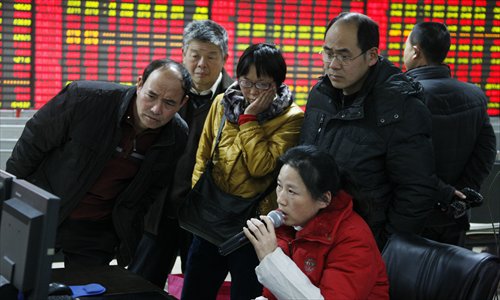HOME >> BUSINESS
Shanghai-HK stock plan adjusted
By Hu Weijia Source:Global Times Published: 2014-12-15 22:48:01
Analysts expect scheme’s coverage to expand

Investors look at share prices at a stock brokerage in Huaibei, East China's Anhui Province on Monday. Photo: IC
The list of eligible shares that investors are allowed to trade under the Shanghai-Hong Kong Stock Connect program was adjusted Monday, with 28 Shanghai-listed stocks added to the list and 27 Shanghai-listed ones removed from the list, Shanghai Securities News reported Monday.
The newly added stocks include Taiyuan Heavy Industry Co, while those eliminated include Anhui Golden Seed Winery Co, according to the report.
The adjustment marked the first slight expansion of the list of mainland companies that are open to trading by Hong Kong and overseas investors since the stock connect program was launched on November 17.
The pilot program, which is aimed at opening up China's capital markets and boosting globalization of the yuan, gives investors mutual market access. When the program was launched, Hong Kong investors were able to buy and sell 568 Shanghai-listed shares, while mainland buyers had access to 268 Hong Kong stocks.
Following the adjustment, the total number of Shanghai-listed shares eligible under the program increased to 569, with five Hong Kong-listed shares having been added to the list on December 8, according to a statement released Sunday by Hong Kong Exchanges and Clearing Limited (HKEx).
The elimination of the 27 stocks is largely due to their poor performance under the program in its first month but it doesn't mean the number of eligible stocks will decline, Tan Ruyong, a professor of finance at Shanghai University of Finance and Economics, told the Global Times on Monday.
The expansion of the list is expected to continue in the coming months, Tan noted.
During the first four weeks since the program's debut, the average daily turnover for northbound trading in Shanghai-listed shares was 5.84 billion yuan ($943 million), while average daily southbound trading turnover in Hong Kong-listed shares was only 757 million yuan, HKEx said in the statement.
The imbalance between southbound and northbound trading will continue in the coming months as Hong Kong and overseas institutional investors are eager to enter the A-share market, which was less accessible before the program started, Cai Junyi, chief analyst at Shanghai Securities, told the Global Times on Monday.
Hong Kong and overseas investors previously traded in mainland shares mainly through the Qualified Foreign Institutional Investor program, which had greater restrictions on trading.
Some blue chip stocks that are priced lower in the mainland than on the Hong Kong bourse have received investment from Hong Kong and overseas during the last four weeks, but the strong rise in the Shanghai Composite Index during the period was mainly due to domestic investors, Cai said.
The index had surged by 19 percent on Monday compared with the level on November 17.
Further development of the stock connect program and opening-up of China's capital markets are expected in 2015, which will attract more foreign capital and continue to boost the globalization of the yuan, Tan said.
The launch of the stock connect program has underlined China's efforts to promote use of the yuan in the global market, as under northbound trading, overseas investors need to acquire offshore yuan before they can invest in the A-share market.
Posted in: Markets